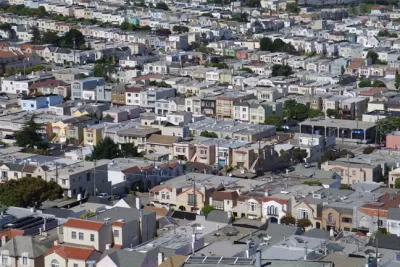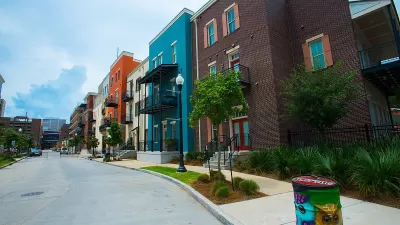The policy tools used to address our nation's housing shortfall often seem to worsen the problem. But this is because they ignore the underlying infrastructure and financing to support growth.

The high cost of housing is one of the most challenging planning issues of our time. The meager supply of affordable housing is a major contributor to the problem, yet the policy tools to address the shortfall often seem to worsen the problem. But this is because they ignore the underlying infrastructure and financing to support growth.
Housing affordability is really about two things: income and cost. The building industry is doing very little about the former, oftentimes opposing prevailing wages for construction workers. On the latter, the key question (being debated in California now) is whether deregulation of market rate housing projects will somehow "trickle down" to households, enabling them to afford rising rents and mortgages.
The supply-side perspective, espoused by the state's Legislative Analyst Office (LAO) suggests that the solution to containing housing costs is building 100,000 additional units annually. Given the LAO's skepticism of affordability restrictions, the theory is that the housing bought by wealthier people will filter down to poorer people as the wealthy move up to more expensive housing.
This trickle-down theory is very leaky. It depends on upward mobility in the middle class, and assumes that there are no foreign investors swooping in with hard cash and clogging up the filtration system. And even if it did occur, research by the Urban Displacement Project shows that the filtering process can take generations, whilst the properties deteriorate. The steeper the price increases, the slower the rate of filtration. Also, if wealthy buyers are willing to pay exorbitant sums for an old house in order to give it a pricey makeover, the theory is turned downside up. I’d call it "trickle-up."
FULL STORY: The Real Reasons Affordable Housing Isn’t Being Built in California

Alabama: Trump Terminates Settlements for Black Communities Harmed By Raw Sewage
Trump deemed the landmark civil rights agreement “illegal DEI and environmental justice policy.”

Study: Maui’s Plan to Convert Vacation Rentals to Long-Term Housing Could Cause Nearly $1 Billion Economic Loss
The plan would reduce visitor accommodation by 25% resulting in 1,900 jobs lost.

Planetizen Federal Action Tracker
A weekly monitor of how Trump’s orders and actions are impacting planners and planning in America.

Waymo Gets Permission to Map SF’s Market Street
If allowed to operate on the traffic-restricted street, Waymo’s autonomous taxis would have a leg up over ride-hailing competitors — and counter the city’s efforts to grow bike and pedestrian on the thoroughfare.

Parklet Symposium Highlights the Success of Shared Spaces
Parklets got a boost during the Covid-19 pandemic, when the concept was translated to outdoor dining programs that offered restaurants a lifeline during the shutdown.

Federal Homelessness Agency Places Entire Staff on Leave
The U.S. Interagency Council on Homelessness is the only federal agency dedicated to preventing and ending homelessness.
Urban Design for Planners 1: Software Tools
This six-course series explores essential urban design concepts using open source software and equips planners with the tools they need to participate fully in the urban design process.
Planning for Universal Design
Learn the tools for implementing Universal Design in planning regulations.
Caltrans
Smith Gee Studio
Institute for Housing and Urban Development Studies (IHS)
City of Grandview
Harvard GSD Executive Education
Toledo-Lucas County Plan Commissions
Salt Lake City
NYU Wagner Graduate School of Public Service





























